Cover Story
JEFF AND BEATRIZ PEKAREK: Bringing a World of Music to San Diego
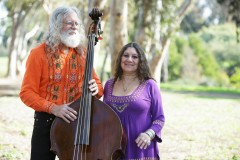
Jeff & Beatriz Pekarek. Photo by John Hancock.
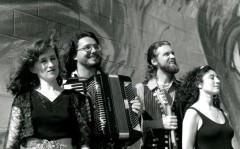
The Electrocarpathians ca. 1988
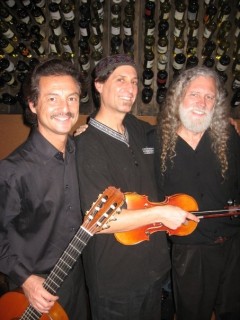
Long time friends: Fred Benedetti, Yale Strom, Jeff Pekarek
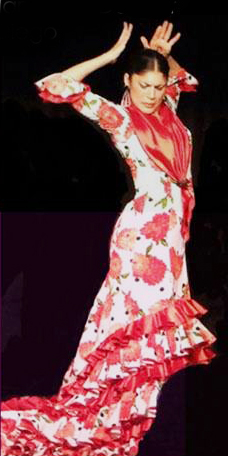
Renowned flamenco dancer Lakshmi Basile, Jeff & Beatriz’ daughter
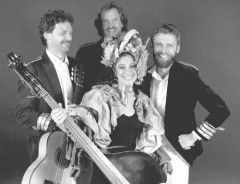
Blackthorne’s Maritime Band 1988: George Svoboda, Dick Tibbets, Beatriz & Jeff

Fred Benedetti & Jeff Pekarek when they were teenagers
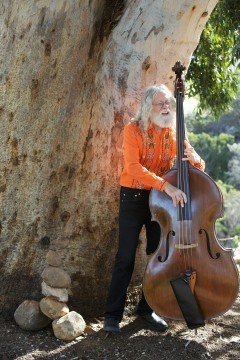
Photo by John Hancock
“You look familiar.” Jeff Pekarek is examining me with one of those, “I think we went to high school together,” expressions. Beatriz Basile, his wife, looks up at me and wordlessly nods in agreement.
I take a good gander at both of them as I wait for my Expensive-o-latte at the counter at Starbucks. As with me, there are a few more wrinkles and some more grey hair from oh, so long ago, reminding me that it has been decades, not years, since I was a regular at their shows. “The Better Worlde Galleria,” I say. “I used to come to hear you all play over there. I was a big fan of the Electrocarpathians.” I get a sense of “gee whiz” from both of their smiles, as though they are both pleased and a bit surprised. I usually have a hard time interviewing two persons at the same time, but I’m guessing that this is going to be a pleasant interview.
Before there was worldbeat. Before the word “multicultural” was coined to describe 87.4% of the music you now hear, before “eclectic mix” became the byline of any band that might have a bouzouki in tow, there were the Electrocarpathians. Way back in the eighties, before just about any other American bands were hip to the music of Hungarians and Slavs, Jeff and Beatriz, with their band the Electrocarpathians, were introducing the sounds of Bulgaria, Poland, Romania, and the rest of Eastern Europe to San Diego and the rest of southern California.
The rise of worldbeat, the craze for klezmer, and the interest in ethnic music may very well have come along without these two exceptional performers, but it would not have been the same without them. Their performances were always lively, with a great deal of effort made to get the sounds and the styles of the folk songs down as authentically as possible.
Jeff Pekarek plays a number of instruments, but his primary instrument is the double bass. As with many a performer of this very large and beautiful instrument, he had started out as a guitar player, switching to the bass in junior high school when Mr. Lykke, the string orchestra teacher, asked him to take up the unwieldy instrument for the orchestra. The move to the bass, however, may have already been in the works. In junior high, when he would jam with lifelong friend and now one of southern California’s premier classical guitarists, Fred Benedetti, Jeff would alter his guitar in order to play bass. “I’d add the two lower strings to my guitar and I’d play bass lines. Hey, we needed somebody to play the bass,” he says.
Realizing that her son was showing some talent for the string bass, Jeff’s mother encouraged him to take private lessons outside of the orchestra at school. His mother introduced him to the renowned Frederico Silva. He then took lessons with San Diego’s godfather of the double bass, Bert Turetsky. “I couldn’t keep playing the guitar,” Jeff says. “There is no way that I could outshine Fred.”
At 17, Jeff became the second youngest musician to be contracted with the San Diego Symphony. He was a full member of the bass section, a position normally achieved after years of studying at a music conservatory. The years with the symphony gave Jeff an incredible experience of performing wonderful music with exceptional musicians, and he also remembers the stars who graced the stage with the San Diego Symphony. “There was Danny Kaye, Sergio Mendez. There was also Richard Harris. I remember that I actually got to shake hands with Arthur Rubenstein,” he says as he recalls being speechless with nervousness as he gripped the hand of the Polish-born pianist.
Not only did he perform with the Symphony as part of the bass section. But in 1976, a year after the teenager contracted with the symphony, he also performed the Dragonetti Double Bass Concerto in A Major, a musical tour de force for any bassist.
Without a trace of regret in his voice, Jeff relates how, while in his early twenties, he left the Symphony. “They were pretty upset when I left. I only gave them two weeks notice, but I was just too restless,” he says.
In the decades since, he has performed with a great number of musicians and bands. He has often performed with classical and jazz guitarist Peter Pupping and classically trained bluegrass fiddler Richard Greene. He has also formed or co-formed a number of ensembles. One constant in Jeff’s musical life is his love of ethnic music and folk music. “When I was 15, I was listening to a lot of Steeleye Span and Gentle Giant, so I was influenced by the English folk-rock,” he says. At 16, he received a balalaika, which sent him in the direction of Czech music and Eastern European music. “And then I started playing bluegrass around 1979, 1980, which seems like a natural outgrowth because there is so much of English folk music that bluegrass is descended from. And then after that I started to move into Irish folk music.”
Way back in 1978 Jeff was one of the founding members of the Jackstraws, the San Diego musical institution that has as many costumes as it does songs. If you’ve been around San Diego for very long and seen a troupe of singing pirates at Seaport Village, or a Gypsy band livening up the scene at Sea World, or any number of costumed characters performing at Horton Plaza or the Zoo, you’ve experienced the San Diego musical juggernaut known as the Jackstraws. Even from the very beginning Jeff remembers that the organization emphasized variety. “We had costumes to be lumberjacks and pirates. We had Renaissance costumes; we had tuxedoes. I think at the time, when we started out, we had ten sets of costumes all together.” The Jackstraws continue to perform to this day. Jeff played with the Jackstraws during the late seventies, and after a hiatus of a few years, rejoined the band from approximately 1984 through around 1987.
At six years old, Beatriz was already a dancer. “I was a very hyper child,” she says. “I was always into everything and I couldn’t stop. Putting me into dance class by my parents was one way to channel my energy.” She danced in a few music troupes, participated in a few dance competitions, earned a scholarship, and even wound up being an extra in a few Argentine films. The big turning point came when, at the age of 15, she landed a part in the musical Hair.
Everything was all well and good, up until Beatriz’s parents found out that in one of the scenes the entire cast of the show, including their 15-year-old daughter, took off all their clothes on stage. They wanted their teen daughter out of the production pronto. But they had nonetheless signed a contract, a binding contract, which allowed their daughter to perform in the show, including the nude part.
So a big dilemma: nudity + a binding contract + a 15-year-old daughter.
What to do?
Beatriz left the country.
As quickly as you can say “The Age of Aquarius,” Beatriz was on a cruise ship heading for Europe. As for exiting Argentina to get out of a contract, the next time she found herself back in her home country was ten years later. One can only surmise that signatures on dotted lines some ten years before had long been forgotten.
Always forging ahead, Beatriz was involved in a number of activities. She became an inveterate traveler, having lived, worked, or at least passed through a number of countries. Back in the seventies Fascist dictator Francisco Franco ruled Spain like a, well, Fascist dictator, restricting freedom of speech, freedom of assembly, and just about all the freedoms you can list. Once Franco died and the Iberian country heaved a sigh of relief, Beatriz took advantage of the new breath of freedom and opened a head shop in Barcelona and later opened a head shop in Ibiza.
Over the next several years Beatriz’s travels took her to Spain, Italy, and to England. And in England was where she met Jeff. Jeff was playing music in the streets and researching British folk music at the time. “I was busking at Camden Lock and visiting the library there. I was looking into British songs about ghosts,” he remembers. The two lived in the same neighborhood and, as they both agree, didn’t like each other for the first six months that they got to know each other. Jeff was about to return to the States. “As a matter of fact I went to the consulate to get a two-week extension on my visa. I needed a little more time. I just didn’t have the money to get a ticket back.”
Beatriz was living in England but working in Spain. Besides dancing in some flamenco ensembles, she became known in Iberia for her spot-on impersonation of the very fiery, very dramatic, and very Spanish, singer, dancer, and actress, Lola Florez. One day Beatriz was visiting with some folks who lived in the house where Jeff lived. Out of the blue, and simply out of what would best be described as neighborliness, Jeff invited Beatriz to dinner. “My kids were with me, and my daughter was always the boss. So I asked her, ‘Would you like to stay here for dinner?’ She looked up and said, ‘Okay, Mommy.’”
Dinner was shared, and within ten days the couple knew that they were getting married. Jeff finally did get the money together for a plane ticket, with Beatriz and her children following soon afterward.
Having lived the life of a musician from tip jar to tip jar, the lure of a steady paycheck had the couple and their family moving to northern California, where Jeff worked as a machinist. But it was the promise of performing with Fred Benedetti that brought him and his family back down to San Diego. Benedetti was forming a group that incorporated a cello, but things weren’t working out. The material required a fair amount of improvisation, and the cellist’s improv abilities were lacking. Benedetti convinced Jeff that he could more than fill the bill. But by the time Jeff, Beatriz, and their family made it to San Diego, the business deal behind forming the band had fallen through.
Jeff and Beatriz were thus back in San Diego with their children to feed but no gigs for Jeff. All was not for naught, however. Benedetti arranged for Jeff to take over as a music teacher at the Bishop’s School. He taught guitar, cello, bass, and double bass. He also directed student recitals and served as the conductor of the school’s jazz band.
A lifelong friend and musical collaborator for Jeff is Yale Strom. The two go back to junior high together, and they have performed together often. Strom is, of course, known as one of the world’s authorities on klezmer music and the lives of Eastern European Jews. Jeff has often performed with Strom’s klezmer ensemble Hot Pstromi. He has arranged music for films made by Strom; and he provided a chapter on playing klezmer bass for Strom’s book Shpil: The Art of Playing Klezmer.
The two are such a great musical fit that performing as a duo — Strom’s violin and Jeff’s bass — it sounds as though three or four instruments are being played. “Back then Yale was going over to Eastern Europe to study klezmer. And there are a lot of similarities between klezmer and the other Eastern European music that I took an interest in,” Jeff says. Yale kept coming back to San Diego and saying, ‘Listen, klezmer, this stuff is going to really take off soon.’ And it did. Back then there weren’t many bands performing klezmer, but within a few years it got really big.”
As Jeff performed and arranged music, Beatriz was busy with raising the children. She also did the annual tour of Renaissance fairs, operating a booth for The Dye Spot, an organization that specializes in manufacturing period clothing and costumes for attendees of Renaissance fairs. At the time, Jeff had put together a band to play Eastern European music and Gypsy music. They scored a gig working at Horton Plaza (back in the good old days when the shopping mall actually featured live musicians performing live music). Afterward, the agent who had hired them went to a board meeting, during which it was decided that the Gypsy band needed to have a fifth member, a girl with a tambourine, because every Gypsy band in the world has a girl playing tambourine, right?
“They called us up and told us of their decision, and that they would pay for the fifth member. The agent even went so far as to say, ‘If you don’t have the girl with the tambourine, you can forget it.’” The next thing Beatriz knew, she was suddenly playing tambourine in an Eastern European band with her husband. “I was playing polkas on the tambourine, which is kind of hard if you think of that kind of music. I found the odd-metered songs much easier to play,” she says. Though Jeff is one of the most accomplished bassists in San Diego, you’re just as likely to see Beatriz, in a performance of the Electrocarpathians, playing the large instrument while Jeff picks up a guitar or bouzouki.
What was to become the Electrocarpathians was known at the time as the Transylvanian Quartet and, with the addition of Beatriz, the Transylvanian Quintet. “I was willing to let the other bands do some of the more esoteric stuff. We were more interested in playing polkas and waltzes,” Jeff says.
Beatriz recalls that all of the children would take part in the performances of the Electrocarpathians. “They all would come on stage and dance with me.” Of her four children, all of them attending San Diego’s School of the Performing Arts, three wound up being heavily involved in the arts. Her one daughter, the exception to the rule, wanted a career and a desk and wound up being a healthcare professional.
Their daughter Lakshmi began dancing professionally at the age of 16. She studied dance at the University of California Santa Barbara and studied with Antonio Vargas, one of the world’s leading flamenco dancers. Like her mother, Lakshmi traveled off to Spain. While there she studied the dance form intensely with the Farruco Family, famous for their fire and intensity. Considered by many to be the purest Gypsy-style flamenco dancer in the U.S, Lakshmi has also been the only foreign-born dancer to regularly perform as a soloist at Spain’s tablao El Palacio Andaluz.
Based in San Diego, Beatriz’s son, Siddarta Basile, is a composer and trumpet player. Beatriz says, “He was born in Holland. He went to the Conservatory of Music there.” While he was growing up here in the States and a teen attending the performing arts high school, he was chosen to play the trumpet for Bill Clinton while the president was visiting San Diego.
Continuing the tradition of exploration and experimentation, the newest performance effort of Jeff and Beatriz is their Pan-American Chantey. As the couple describes it, the project is a storytelling medium that combines film noir with sea chanteys. Now, before you think that there is no way to combine Sam Spade with old songs of tall ships, give the idea a chance. “We tell the story like an old-time radio show. We incorporate a lot of different elements, including poetry. The sea chanteys serve the function of a Greek chorus, commenting on the story as it unfolds,” Jeff explains.
The story is loosely tied to the Pan-American Expo, the big San Diego celebration that is celebrating its hundredth anniversary this year, which gave us the charming Churrigueresque towers and buildings in Balboa Park. Jeff says, “It’s also a story about a continuing journey. Being in all the different countries, it’s really a story about Beatriz in that way .”
As the old saying goes, talented musicians are busy musicians, and Jeff and Beatriz have a busy schedule this month. On the 13th Jeff will be playing bass with pianist and composer Tom Barabas, trumpeter Phil Tauber, percussionist Geraldo Compilati, and multi-instrumentalist Gary Lehmann for their debut at 98 Bottles as the ensemble Innerscape. The show starts at 8pm. On Valentines Day, once again as a bassist, Jeff joins Peter Pupping and his quartet for a Latin jazz program.
An expansive and sure-to-be-top-notch review of some of the best tango music, including the music of Astor Piazzolla, will be performed by Camarada, San Diego’s stellar organization known for their mix of classical music and popular genres. Jeff will be playing bass in the ensemble at Bread and Salt (on Park Blvd.) in a performance on February 21. He will also serve as the bassist in the Fred Benedetti Trio for a birthday tribute to George Harrison (The “quiet one” of the Fab Four would have turned 72 on the 25th of this month.) at San Diego’s mainstay for music, Dizzy’s.
Next month Beatriz will be the bassist for more sea chanteys and Irish songs (Jeff will play guitar at this gig.) as they appear as Blackthorne’s Maritime Band at the 26th annual Westcoaster Toy Soldier Show at the Irvine Marriot Hotel. It all happens on March 8.










